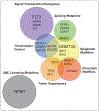Driver mutations in acute myeloid leukemia
- PMID: 31972687
- PMCID: PMC11104430
- DOI: 10.1097/MOH.0000000000000567
Driver mutations in acute myeloid leukemia
Abstract
Purpose of review: The mutational landscape of acute myeloid leukemia (AML) has revised diagnostic, prognostic, and therapeutic schemata over the past decade. Recurrently mutated AML genes have functional consequences beyond typical oncogene-driven growth and loss of tumor suppresser function.
Recent findings: Large-scale genomic sequencing efforts have mapped the complexity of AML and trials of mutation-based targeted therapy has led to several FDA-approved drugs for mutant-specific AML. However, many recurrent mutations have been identified across a spectrum from clonal hematopoiesis to myelodysplasia to overt AML, such as effectors of DNA methylation, chromatin modifiers, and spliceosomal machinery. The functional effects of these mutations are the basis for substantial discovery.
Summary: Understanding the molecular and pathophysiologic functions of key genes that exert leukemogenic potential is essential towards translating these findings into better treatment for AML.
Conflict of interest statement
A.D.V. received travel support from Mission Bio and is on the Editorial Advisory Board of Hematology News. R.L.L. is on the supervisory board of QIAGEN and is a scientific advisor to Loxo, Imago, C4 Therapeutics, and Isoplexis. He receives research support from and consulted for Celgene and Roche and has consulted for Janssen, Astellas, Morphosys, and Novartis. He has received honoraria from Roche, Lilly, and Amgen for invited lectures and from Gilead for grant reviews. A.K. has no competing interests to disclose.
Figures
References
-
- Falini B, Mecucci C, Tiacci E, et al. Cytoplasmic nucleophosmin in acute myelogenous leukemia with a normal karyotype. New Engl J Med 2005; 352:254–266. - PubMed
Publication types
MeSH terms
Substances
Grants and funding
LinkOut - more resources
Full Text Sources
Medical
Research Materials
Miscellaneous


